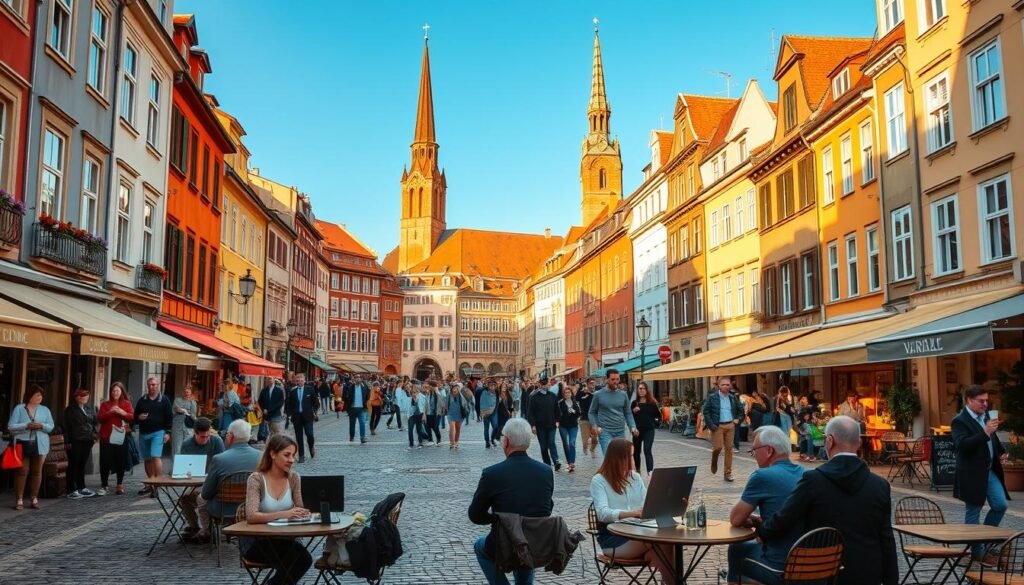
Best Budget Cities in Europe for Remote Workers
Posted in :
Exploring remote work in Europe reveals a world of opportunities for digital nomads. Europe’s mix of culture, lifestyle, and affordability makes it a top choice.
The rise of remote work has changed the game. Now, people can work from anywhere. Europe’s cities offer a perfect setting, with many affordable european destinations to explore.
Finding a balance between cost and quality of life is crucial. In this article, we’ll look at the best budget cities in Europe for remote workers.
Key Takeaways
- Europe is a hub for remote workers, offering a mix of culture and affordability.
- Several European cities stand out for their budget-friendliness.
- Remote work trends are changing the way we live and work.
- Digital nomads can find a great quality of life in Europe.
- Affordability and lifestyle are key considerations for remote workers.
The Remote Work Revolution in Europe
The pandemic has changed how we work, making Europe a top spot for remote workers. Many cities now attract remote professionals with their affordability and charm.
Europe’s mix of culture, history, and modern tech is perfect for work and travel. The pandemic pushed people to seek flexibility and new places to live and work.
The Rise of Digital Nomadism Post-Pandemic
Europe quickly adapted to remote work after the pandemic. Cities once seen as too pricey or old-fashioned are now hubs for remote workers. Key reasons include:
- Improved digital infrastructure: Cities have invested in fast internet and co-working spaces, helping remote workers stay productive.
- Affordability: European cities offer a great quality of life at a lower cost than many other places.
- Cultural diversity: Europe’s rich culture and languages add depth and excitement for digital nomads.
Why Europe Offers Unique Opportunities for Remote Workers
Europe’s varied landscapes, from the Mediterranean to the Baltic, offer different lifestyles and environments. This variety, along with Europe’s small size, makes it easy to explore and work.
Eastern European cities are among the cost-effective European cities for remote work. Places like Lisbon, Portugal, and Budapest, Hungary, are favorites. They offer a low cost of living, modern comforts, and rich cultural experiences.
In summary, Europe’s affordability, cultural richness, and modern setup make it a prime spot for remote workers. As remote work grows, Europe will likely stay a favorite among digital nomads.
What Makes a City Budget-Friendly for Remote Professionals
Remote professionals look for the perfect European city. They want a place that’s affordable, has good infrastructure, and a great lifestyle. As more people work remotely, knowing what makes a city cheap is key.
Essential Cost of Living Factors
The cost of living is very important. Accommodation costs like rent and utilities are big expenses. Cities with cheap housing, like shared places or apartments away from the center, are better for those on a budget.
Food and transportation costs also matter a lot. Places with cheap public transport and lots of food options help keep costs down. A city with a lively food scene can offer a great life without breaking the bank.
Remote Work Infrastructure Requirements
Fast and reliable internet is essential for remote work. Cities with good digital infrastructure, like Wi-Fi and co-working spaces, attract remote workers. Having modern workspaces with amenities is also important.
But it’s not just about internet. Reliable public transportation and places like cafes and gyms are important too. They help remote workers live well and work well.
Quality of Life Considerations
Quality of life is also crucial. Things like language support, cultural activities, and community events make a city better. Cities with lots of things to do, from sports to culture, are more appealing.
Also, safety, healthcare, and the environment are key. Remote workers want to feel safe and healthy. They want a city that supports a good life while working from home.
In short, a good city for remote workers is affordable but also has great infrastructure and lifestyle. By looking at these factors, remote workers can find the best European cities for their needs.
Lisbon, Portugal: Sunshine and Affordability
Lisbon, Portugal, is becoming a top spot for remote workers. It offers sunshine, affordability, and a great lifestyle. The city has a rich culture, modern comforts, and a relaxed vibe that attracts digital nomads from all over.
Monthly Budget Breakdown
Lisbon is known for being affordable. Here’s what remote workers can expect to spend each month:
- Accommodation: A one-bedroom apartment in the city center costs $600-$800 per month.
- Food: Meals start at $5-$7. Basic groceries for one person are about $30-$50 a week.
- Transport: A monthly public transport pass is $35-$45. It’s a cheap way to get around.
Living comfortably in Lisbon costs around $1,500-$2,500 a month. This makes it a great choice for those looking for affordable european destinations for digital nomads.
Top Co-working Spaces and Digital Nomad Communities
Lisbon has a growing remote worker community. There are many co-working spaces for different needs. Here are some of the best:
- Lisbon Cowork: Offers day passes and monthly memberships in a lively setting.
- Second Home: Provides a luxurious work environment with fast internet and networking chances.
- Hub Lisbon: A place for startups and remote workers, with flexible plans and events.
These spaces offer reliable internet, comfy work areas, and host events. They help remote workers meet others with similar interests.
Lifestyle Perks That Won’t Break the Bank
Lisbon has many affordable lifestyle perks. Here are some highlights:
- Cultural Events: Lisbon has many cultural festivals all year, often free or cheap.
- Outdoor Activities: The city is close to beaches and hills. Hiking and surfing are cheap or free.
- Gastronomy: Lisbon’s food scene is rich and affordable. You can try traditional Portuguese dishes at low prices.
Lisbon’s mix of affordability, culture, and lifestyle makes it perfect for remote workers. It offers a high quality of life without the high costs of other European cities. It’s why Lisbon is a top choice for those seeking cheap cities in europe for working remotely.
Budapest, Hungary: Eastern European Value Champion
In my search for economical European cities, I found Budapest to be a top choice. It offers culture, good infrastructure, and is affordable. As a remote worker, finding a place that’s both productive and has a good quality of life is key. Budapest meets these needs perfectly.
Comprehensive Cost Analysis for Remote Workers
Budapest is known for being affordable, with a lower cost of living than Western European capitals. Here’s a look at typical monthly costs:
| Expense | Average Cost (USD) |
|---|---|
| One-bedroom apartment in city center | $400-$600 |
| Meal at a local restaurant | $5-$10 |
| Public transportation monthly pass | $20-$30 |
Internet Infrastructure and Productive Workspaces
Budapest has reliable and fast internet, important for remote workers. The city has many co-working spaces for different needs.

- Popular co-working spots include Koffice, MyOffice, and Alley.
- These places offer fast internet and other amenities like networking events.
Thermal Baths and Cultural Experiences on a Budget
Budapest is known for its rich culture and thermal baths. Visiting these baths is relaxing and affordable, with prices from $10-$20 per person.
The city also has many museums, historical sites, and cultural events. Most are free or low-cost. This makes Budapest great for remote workers who enjoy culture without spending a lot.
Prague, Czech Republic: Historic Beauty with Modern Amenities
Prague is a standout among budget-friendly European cities. It mixes old-world charm with today’s comforts. It’s perfect for remote workers who want culture and savings.
Realistic Monthly Expenses for Digital Nomads
Living in Prague is cheaper than in many big European cities. A one-bedroom apartment in the city center costs about $800-$1,200 a month. Food prices are low, with meals starting at $3-$5. Public transport is affordable, with a monthly pass costing around $15.
Here’s a look at typical monthly costs:
- Accommodation: $800-$1,200
- Food: $300-$500
- Transportation: $15-$30
- Co-working spaces: $100-$200
Best Neighborhoods for Remote Workers
Prague has different districts, each with its own vibe. Old Town is lively and historic, with lots of cafes and workspaces. Vinohrady is quieter, with a local feel and various places to stay. Smíchov is great for expats, with modern homes and services.
Balancing Work and Exploration in the City of Spires
Prague makes it easy to work and play. It’s full of history, culture, and life. Remote workers can visit Charles Bridge and Prague Castle when they’re not working. The city is small, so getting around is easy.
In the evenings, workers can relax in Prague’s thermal baths or enjoy the beer scene. Prague offers a mix of history, culture, and modern life, making it a top choice for digital nomads.
Budget-Friendly European Cities for Remote Workers Beyond the Mainstream
Europe’s hidden cities are becoming popular with digital nomads. They offer culture, affordability, and a great quality of life. These places are hard to resist.
Tbilisi, Georgia: The Digital Nomad Frontier
Tbilisi, Georgia’s capital, is a hotspot for remote workers. It has an affordable cost of living and modern amenities. The city mixes ancient history with modern culture, featuring thermal baths and a vibrant arts scene.
Living in Tbilisi is cheap, with a one-bedroom apartment costing $200-300 monthly. Meals start at $3-5. Internet speeds are decent, averaging 20 Mbps, perfect for remote work.
Sofia, Bulgaria: Tech Infrastructure at Bargain Prices
Sofia is gaining popularity among remote workers. It has modern tech infrastructure and a thriving startup scene. All at a fraction of Western European costs.
Apartments in Sofia cost $250-400 monthly for a one-bedroom. The city has many coworking spaces with high-speed internet and a community of professionals.
| City | Average Rent (1-bedroom) | Average Meal Cost | Average Internet Speed |
|---|---|---|---|
| Tbilisi | $200-300 | $3-5 | 20 Mbps |
| Sofia | $250-400 | $5-10 | 50 Mbps |
| Krakow | $300-500 | $7-12 | 30 Mbps |
| Valencia | $400-600 | $10-15 | 100 Mbps |
Krakow, Poland: Affordability Meets Historical Charm
Krakow is rich in history, with medieval architecture and a lively culture. It’s also a favorite for remote workers, offering affordability and high quality of life.
The cost of living is reasonable, with $300-500 monthly for a one-bedroom. Krakow has many coworking spaces and a growing digital nomad community.
Valencia, Spain: Mediterranean Living Without the Price Tag
Valencia offers Mediterranean culture and modern amenities at a lower cost. Remote workers can enjoy beautiful beaches, a vibrant arts scene, and a relaxed lifestyle.
The cost of living in Valencia is affordable, with $400-600 monthly for a one-bedroom. The city has high-speed internet, making it great for remote work.

These cities offer a great mix of affordability, culture, and lifestyle for remote workers. Whether you’re into ancient history, modern tech, or Mediterranean charm, there’s a budget-friendly European city for you.
Money-Saving Strategies While Working Remotely in Europe
Working remotely in Europe can be both exciting and challenging. I’ve found many ways to save money without giving up quality of life. Living in a new continent offers unique experiences.
Housing Hacks: From Co-living to Long-term Rentals
Finding affordable housing is key for remote workers. Co-living spaces offer a community feel at a lower cost. Long-term rentals also provide better value than short-term leases.
- Look for apartments outside the city center for lower rents.
- Use online platforms to find roommates and split the cost.
- Negotiate with landlords for better deals on long-term rentals.
Transportation Tips to Minimize Daily Expenses
Transportation costs can add up. Buying a monthly public transport pass is often cheaper than single tickets.
| City | Monthly Pass Cost | Single Ticket Cost |
|---|---|---|
| Lisbon | $35 | $1.50 |
| Budapest | $25 | $0.75 |
| Prague | $30 | $1.00 |
Food and Entertainment Without Financial Strain
Eating out can be pricey. Cooking your own meals saves money. Many co-living spaces have communal kitchens.
For entertainment, find free or low-cost events. Look for outdoor concerts or museum days.
Banking, Taxes, and Financial Management Abroad
Managing finances abroad requires planning. Open a local bank account to avoid high fees. Research tax implications in your host country.
Remember: Stay updated on tax law changes that might affect you as a remote worker.
Overcoming Challenges in Cost-Effective European Cities
Many people dream of working remotely in affordable European cities. But, it’s important to know the challenges and how to solve them. These cities offer a great mix of cost and lifestyle. However, there are obstacles to a smooth remote work experience.
Language Barriers and Communication Solutions
One big challenge is the language barrier. Even though many Europeans speak English, sometimes it’s hard to communicate.
To tackle this, remote workers can:
- Take language classes to learn the local language
- Use translation apps to help with communication
- Join expat communities where English is more common
Seasonal Considerations and Timing Your Stay
Adapting to seasonal changes in a city can be tough. Some cities are very different in the off-season than during peak tourist times.
To handle this, consider:
- Learning about the city’s seasonal patterns before you go
- Planning your work schedule around peak tourist seasons if needed
- Finding indoor or year-round activities to stay productive during slow times
Building Community in Budget Locations
It’s important to build a community to avoid feeling lonely. In affordable European cities, there are growing expat and digital nomad communities.
To connect with others:
- Join local co-working spaces that host events
- Attend meetups for remote workers and digital nomads
- Participate in local activities or join clubs that match your interests
Balancing Work Productivity with Budget Constraints
Remote workers must balance work needs with budget limits. This means finding affordable workspaces, managing living costs, and keeping a healthy work-life balance.
Strategies include:
| Category | Budget-Friendly Option | Productivity Tip |
|---|---|---|
| Workspace | Co-working spaces with affordable plans | Use noise-cancelling headphones to focus |
| Living Costs | Shared accommodation or long-term rentals | Plan meals in advance to save time and money |
| Work-Life Balance | Free or low-cost local activities | Schedule regular breaks to explore the city |
By understanding these challenges and finding solutions, remote workers can thrive in affordable European cities. They can enjoy both affordability and a fulfilling lifestyle.
Conclusion: Creating Your Ideal European Remote Work Experience
Exploring the best budget cities in Europe for remote workers shows a mix of affordability, culture, and lifestyle. Cities like Lisbon, Budapest, and Prague stand out. They offer remote professionals a perfect mix of work and play.
When looking for budget-friendly European cities for remote workers, think about cost of living, remote work setup, and quality of life. Choosing the right place lets you have a great remote work experience without spending too much.
I suggest you check out these cost-effective European cities for remote work. You can find a city that fits your dream, whether it’s Prague’s historic charm or Lisbon’s sunny vibe. There’s a budget-friendly European city waiting for you to explore.
